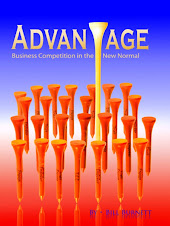(An excerpt from “Advantage: Business Competition in the New Normal”)
C.R.A.P.
Our brains have the automatic ability to see some solutions with a mental snap. It is the moment of insight that magically seems to pop into our brains. If you are a native English speaker, you may experience that snap with the following. (Apologies to those of you who are less familiar with English.) Compound remote associate problems, or C.R.A.P., are used for fascinating brain research by Mark Jung-Beeman at Northwestern University. He and Edward Bowden have compiled a list of these puzzles based on how quickly people get them. The puzzles involve word association. For example, what word is associated with each of these three words: man/stop/wrist? The answer is watch, as in watchman, stopwatch, and wristwatch. Try these four, each with a different answer:
cottage/swiss/cake
rocking/wheel/high
cream/skate/water
show/life/row
Chances are, with at least one of these, you experienced a brain snap, where the answer (cheese, chair, ice, boat) just popped into your head. It’s a little weird because it’s as if your brain does something that you really don’t control or understand. That is why we say our mind seems to automatically find the solution. Neuroscientists like Beeman have done very interesting work in trying to understand what is taking place in the brain when we have these brain snaps, or when we take a bit longer to solve a puzzle. You may find with the following puzzles that you feel more like you are in control of the process. Most of us don’t get these easily if at all. If you get even one, you’re doing better than I did.
reading/service/stick
shadow/chart/drop
land/hand/house
cast/side/jump
Here you may have found yourself doing a great deal more searching, going through the catalogue in you mental dictionary of all the words that are associated with each of the words in the four puzzles. You are trying to force the synthesis through this knowledge review. The answers are...(in the book, of course)

Get a copy by clicking: Advantage: Business Competition in the New Normal








